Viking legacy in Oslo and around (10/25/03)
Last updated 12/01/03
Norway, the homeland of vikings,
welcomed us with such hospitality that we couldn't help staying for a
few days longer than planned (infinitely longer, to be mathematically
precise, since we did not plan on going to Oslo at all). During
the initial planning of our trip to the Scandinavian countries
we were all set on visiting Finland, where Daria had spent a few months
at the University of Vaasa (undergraduate study abroad program).
However after looking at the various transportation options (ferry from
Stockholm to Helsinki being the major contender), we realized that we
would end up spending over 2 days on just travel there and back (over
48 hours). Instead of Helsinki we decided to visit Oslo (Norway),
which, until some time in the recent past, I had thought was located in
Germany (and they say that the American education system is a
failure...).
Visiting Oslo turned out to be the highpoint of our Scandinavian trip
(no offense to Queen Margaret of Denmark, or the Rygerfjord, our ferry-boat-turned-hotel
in Stockholm); after all there is little in this world that can compete
with sweet, brown, goat-cheese. (See
comments to the picture of cheese below for clues.) Supposedly
Oslo is the most expensive
city in the Scandinavian region, but we discovered cheap accomodations
in a B&B with an awesome view of the city. Due to the location of
the B&B (the immigrant district of Oslo), we also managed to find
cheap meals -- I think Turkish food has overtaken all of Europe by now
as there is no place out there where you can't find donner kebabs,
shawerma, or falafels.
Oslo offered a little bit of everything during our trip: beautiful
architecture, a playful romp in the leaves at the Slottsparken, a local
fortress (the Akershus) , excavated Viking ships at the Viking museum
on BygDøy peninsula-- the ships were used as burial vessels
for wealthy people and were actually buried in clay which had
remarkable preservative properties (leather preserved for over 1000
years), and even an entire open air Folk museum (Norsk
Folkemuseum) which housed over 150 Norwegian homes
from different eras.
The oldest of Scandinavia's capitals, Oslo is just 45 years short of
its millenium birthday, being founded by Harald Hardrada in 1048. The
original wooden buildings all burned down during the fire of 1624, and
the entire city was rebuilt a little bit off its first location by the
Danish king Christian IV (Norway was then in a union with Denmark) who
renamed it Christiania after his royal self. Later Norway was ceded to
Sweden and regained independence only in 1905, but Oslo didn't
reinstate its original name until 1925.
Norway is still a kingdom, and the official residence of the king is at
Det Kongelige Slott (the royal palace) in Oslo. The palace building is
not particularly remarkable, other than for a good view of Karl Johans
Gate -- the city's main street that extends down from the palace hill,
but the surrounding park is nice and leafy. The city's military
stronghold -- Akershus Festning (fortress), strategically positioned
over the harbor of Oslofjord -- creates a more impressive presence with
its medieval front (thick walls, towers, cannons, even a drawbridge).
The king Christian IV exerted his power ower this building as well,
renovating it into a Renaissance palace on the inside which we didn't
get to see because of the castle's short hours in winter season.
However, medieval exterior was all we cared about, plus awesome views
of the fjord (bay) of Oslo from the fortress grounds.
The city offers many cultural delights; in addition to the
above-mentioned Folk museum, we visited the National Gallery which
houses a large art collection of Norwegian as well as other European
paintings, including the famous "Scream" by Edvard Munch. Oslo
also has a wonderful park
(Frognerparken) with plenty of statues by Gustav
Vigeland, which displayed a wide range of human emotions (see pics) and
a
partially-frozen lake with ducks (did I mention that I LOVE ducks?
they're so darn cute). From bawling babies, to goat-cheese, to Viking
ships, to homes with legs (much like the Russian witch homes that Daria
has shown me in Russian fairy tales), we got to see it all in the
capital of Norway (didn't even have to leave the city for all of that!).
Having enjoyed the sights of Oslo, we went on a scenic journey
to Bergen via train, ferry and bus to look at the fjords. For those of
you who don't know, fjords are these places where the sea cuts into the
land in narrow, long, finger-shaped inlets. I read about the fjords of
Norway in the works by Douglas Adams and was expecting something
magnificent. The reality turned out to be a bit dull and disappointing
in comparison to my hopes (which is usually the case), but I think it was still worthwhile to
get a first-hand experience of the much-hyped fjords. The journey started with taking a train
for about 5 hours from Oslo to Myrdal, during which time we observed
magnificent landscapes which progressed, with increasing altitude, from
low-lying hills and lakes to entirely frozen lakes, snow-capped peaks
and snowed-over plains. The following 20-kilometer
train ride from Myrdal (altitude 866 meters) to Flam (2 meters above
sea level) took about an hour (do a quick calculation of how steep the
railway track's incline is!) and blew my mind away with the beauty of
mountainous landscapes with innumerable waterfalls. The majestic
Kjosfossen waterfall (see picture) was running full force at the time
of our visit, but many others were partially or even entirely frozen.
Upon arrival in Flam we boarded a small ferry boat which took us
through Aurlandsfjorden and Naeroeyfjorden (extensions of Sognefjorden,
Norway's longest fjord at 204 km and its deepest at 1308 meters). These
fjords are squeezed into thin gashes (only 250 meters across at the
narrowest point) by towering snow-capped mountains, and the view of
rocks reflected in water and seagulls is indeed attractive for the
first five munites, but stops being very entertaining shortly
afterwards, making for a dull hour and a half on the boat. It got worse
when it started to rain and the fjord's rocky walls became all but
invisible. Our main distractions during the ferry ride were the sights
of (a) Asian tourists aboard the ferry taking pictures of each other
ceaselessly, and (b) many "villages" in the mountains which
consisted of just a few homes and had a
population of about 5 or 6 "old people" as stated by the tour guide.
The ferry cruise was followed by a supposedly scenic bus ride on a
mountainous road, but due to the winter conditions it got dark quite
early and the ride took place entirely in the dark. We advise travellers who might follow
in our footsteps to just take the train from Myrdal to Flam, take one
look at the fjord there and head back without a boat cruise, thus
enjoying the amazing nature views from the train first on the way down
to the fjords, and then in ascending order on the return trip.
Pictures
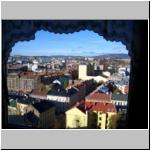
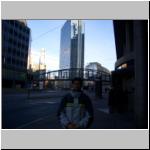
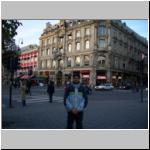
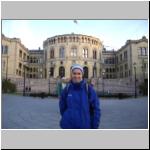
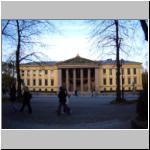
Views of Oslo city center, from modern skyscrapers of steel and glass,
to beatiful classic architecture that would be at home in Paris or
St.Petersburg.
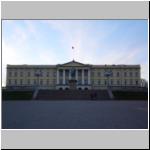
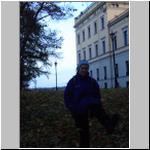
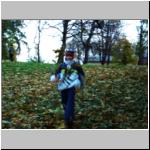
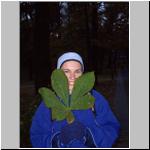
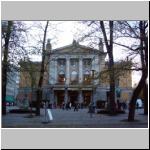
Good old-fashioned fun in the Slottsparken, a nice leafy park around
the royal palace of Norwegian kings. Yes, they still have a king.
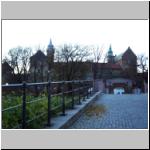
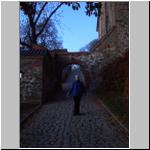
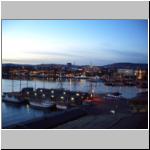
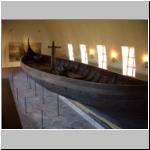
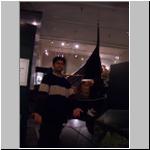
Imagine yourself in the Viking era (9-11 century AD) or in the later
medieval times in Christian Norway when Oslo was renamed into
Christiania.
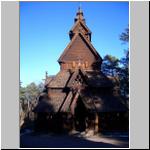
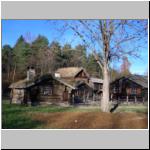
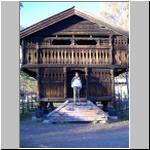
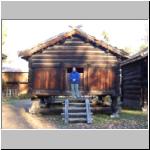
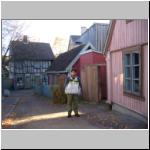
Walking around the wonderful Norsk Folkemuseum where 155 authentic old
Norwegian houses are displayed in park-like natural setting.
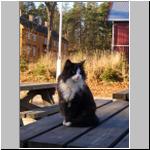
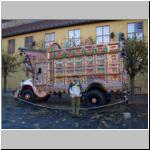
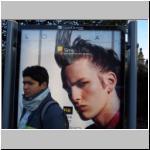
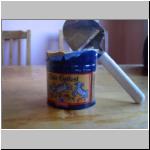
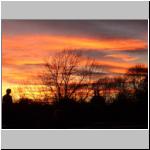
Assorted oddities of Oslo life, from cheese that tastes like boiled
condensed milk (don't ask... Russian specialty) to breathtaking sunset
colors.
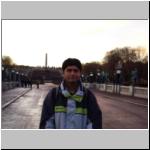
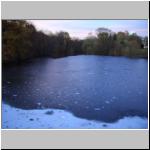
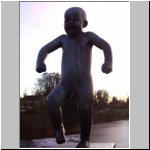
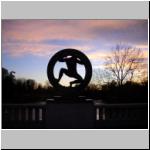
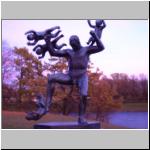
Curious life-sized statues portraying human emotions by Gustav
Vigeland, a genius Norwegian sculptor, line the main alley in
Frognerparken.
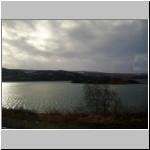
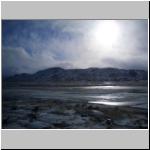
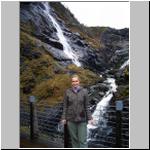
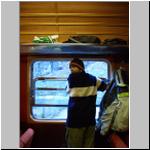
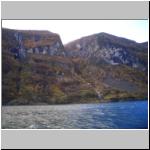
Nature views seen along our train+boat+bus westward journey from Oslo
to Bergen... waterfalls (running and frozen), mountains and fjords
abound.


































